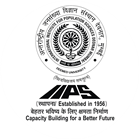- About IIPS
- Academics
- Study @ IIPS
- Departments
- Department of Bio-Statistics and Epidemiology
- Department of Fertility & Social Demography
- Department of Public Health & Mortality Studies
- Department of Migration & Urban Studies
- Department of Population & Development
- Department of Family & Generations
- Department of Survey Research & Data Analytics
- Department of Extra Mural Studies and Distance Education
- Centers
- Controller of Examination
- Programme
- Distance Education (EMS)
- Training
- Facilities/Services
- Resources
- Virtual Learning
- Digital Initiatives (MHRD)
- Notice
- Seminars / Workshops / Conferences
- Conferences
- Publications
- Seminars
- Sponsored Research
- Workshops
- Students exchange
- International Exchange
- National Exchange
- Admission
- Admission Bulletin
- TIME-TABLE For Admission 2021-22
- Model Question Papers
- Fellowships
- Distance Education (EMS)
- International Students
- Visa Information
- Prospectus
- Administration
- Faculty & Staff
- Research & Publications
- Research Projects
- Publications
- Recent Publications
- Library
- Information
- Right to Information
- Annual Report
- Director's Report
- Cells & Commitees
- Cells
- Commitees
- Online Facilities
- Employee's Corner
- Student's Corner
- Memorial Lectures
- Convocation
- IIPS Newsletters
- COVID 19 Information
- Life @ IIPS
Programme Offered
- Home
- Programme Offered
The Department for Extra Mural Studies and Distance Education (EMS&DE) at the International Institute for Population Sciences (IIPS) was established with a recommendation from UGC, New Delhi in the year 1994 to promote the discipline of Population Studies and its allied areas. The Department of EMS&DE at IIPS offers an elevating package of learning experiences. It excludes the formal way of learning by combining classroom sessions (contact programme) at the Institute with self-studies at home. Also making use of computers and IT services to provide interactive personal communications among the faculty members and distance learners. For the last three decades, the Department of IIPS has played a major role in creating a hub in the sub-continent for enhancing the knowledge and professional skills of the participants in the field of population, health and development issues. EMS&DE Department is committed to imparting knowledge of society's most pressing challenges, and pursuing solutions to those challenges through innovative and interdisciplinary research, and education activities.
Presently, the Department is offering the need-based distance course with the recommendation of UGC in the field of population data analysis and inter-relationship between population and development namely;‘MA (Population Studies)’.
MA (Population Studies)
Two-Year Programme
The M.A. program in Population and allied fields from the Dept. of EMS&DE, IIPS provides students with a cutting-edge, multidisciplinary education that will prepare them to be leaders in the field of population, health and development. The curriculum focuses on the foundations of population its related issues, and provides audience with expertise in research and data analysis.
The objectives of the programme are:
- Ensuring academic and professional excellence and providing holistic development of the students,
- Creating competent professionals,
- Generating and disseminating scientific knowledge and evidence,
- Collaborating and exchanging knowledge,
- Advocacy and awareness building.
An Overview of the Programme Structure
| Paper Code | Paper Name | Blocks | Units | Credits |
| MSP-1F | Sociology, Psychology and Anthropology* | 2 | 3 | NC |
| MSP-2F | Economics and Geography* | 2 | 10 | NC |
| MSP-3C | Basic Statistical Methods for Population Studies | 4 | 11 | 4 |
| MSP-4C | Introduction to Demography and History of Population | 3 | 6 | 4 |
| MSP-5C | Fertility and Nuptiality | 4 | 12 | 4 |
| MSP-6C | Evaluation, Adjustment of Demographic Data and Population Projection | 2 | 10 | 4 |
| MSP-7C | Introduction to Demographic and Statistical Software | 1 | 7 | 4 |
| MSP-8C | Migration and Urbanization | 3 | 12 | 4 |
| MSP-9C | Historical Demography | 1 | 6 | 3 |
| MSP-10C | Gender and Reproductive Health | 2 | 8 | 4 |
| MSP-11C | Population and Development | 4 | 12 | 4 |
| MSP-12C | Research Methodology | 2 | 9 | 4 |
| MSP-13C | Concepts and Measures of Global Health | 2 | 6 | 3 |
| MSP-14C | Population Policies, Programme and Evaluation of HFW Programme | 3 | 13 | 4 |
| MSP-15C | Advanced Statistical Packages and Applications in Large-scale Data | 1 | 3 | 3 |
| MPS-16C | Morbidity, Mortality and Public Health | 3 | 9 | 4 |
| MSP-17C | Population Ageing and Health Transition | 3 | 6 | 4 |
| MSP-18E | Urbanization, Space and Planning | 1 | 10 | 3 |
| MSP-18E | Biostatistics and Epidemiology | 5 | ||
| MSP-TP | Dissertation/Term Paper | - | - | 10 |
| MSP-VV | Viva-Voce | - | - | 4 |
| Total | 43 | 158 | 74 | |
*Not counted for calculation of final grade F-Foundation Course, C-Core Course, E-Elective course, NC-Non credited course, VV-Viva-Voce, TP-Term Paper
